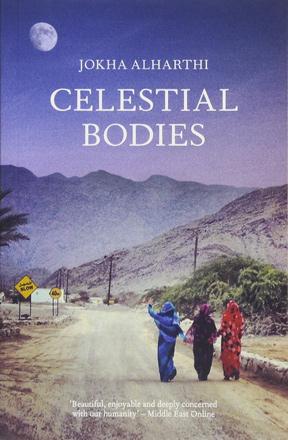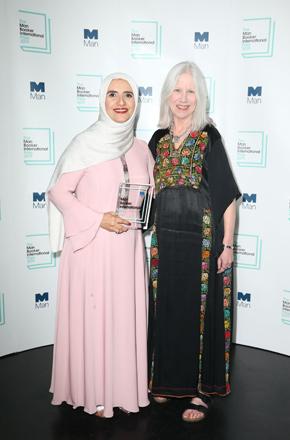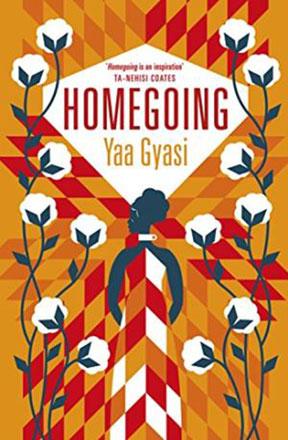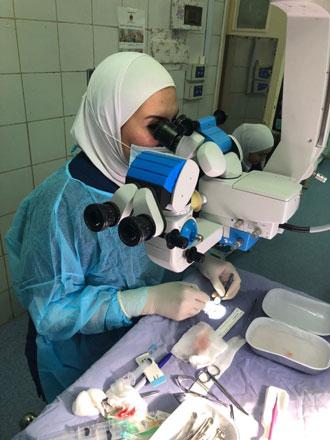You are here
Memories of change
By Sally Bland - Aug 25,2019 - Last updated at Aug 25,2019

Celestial Bodies
Jokha Alharthi
Translated by Marilyn Booth
Scotland: Sandstone Press, 2018
Pp. 243
Jokha Alharthi, a professor of Arabic at Sultan Qaboos University in Muscat, put Oman on the world literary map this year when her novel, “Celestial Bodies”, won the Man Booker International Prize.
This marks the first time an author from the Gulf region has even been nominated for the prestigious award, and the first time an Omani female novelist has been translated into English. Originally published in Arabic as “Sayyidat Al Qamar” (literally Ladies of the Moon), “Celestial Bodies” has been hailed as a novel reflecting transition in one of the most traditional Arab societies. The story is set in the village of Al Awafi, where “people were firm believers in the past; they did not look to the future”. (p. 141)
Yet, change they do, especially after the oil boom, though social change comes more slowly than economic development. From the author’s vivid descriptions, we learn of marriage and birthing customs, as well as landmarks in Oman’s history after Britain gained oil exploration rights and “imperialist greed lit the wick of war”, dividing Omanis into supporters of the British-backed Sultanate and the followers of the Iman. (p. 146)
If the title “Celestial Bodies” sounds ambiguous, evocative and even esoteric, Alharthi’s story is full of its mythical and earthier implications. Platonic, parental, passionate and conjugal love, as well as marriage, play a prominent role in the plot, but so do spirituality, superstition, memory and family history. Transition is a fairly common theme in modern Arabic literature, yet, Alharthi’s book stands out for her innovative scene depiction, tantalising characters and intricate story structure. Her storytelling relies on multiple points-of-view, an omniscient narrator as well as a first-person narrator, the interface of past and present, inclusion of poetry, and semi-supernatural or magical events, which are accepted as natural by the characters and sometimes embody their deepest desires.
“Celestial Bodies” focuses on three generations of prominent families in Al Awafi, who are connected by marriage or other relationships. Complicating the social structure, some still have slaves up until the 1980s, although slavery had been abolished decades before. The story opens with three sisters, emblematic of the second generation, who receive marriage proposals. Mayya, the oldest, is proposed to by Abdullah, the son of the village’s most successful merchant, and the only character to narrate the story, but she has given her heart to another.
The way Alharthi describes Mayya’s feelings is indicative of how she interweaves cosmic dimensions into an otherwise prosaic life: “She sent her spirit into the ether, detaching herself completely from the world. Her body convulsed and she could barely keep herself from collapsing as she telegraphed her whole self to him, transmitting it with every gram of energy she could find.” (p. 5)
However, Mayya receives no response to her monumental effort, so she agrees to marry Abdullah without any pretence of loving him. They do, however, come to share the adoration of their daughter who is incongruously named London, heralding the third generation in the novel, whose lifestyle is unfathomable to their ancestors. In a society that long avoided modern education, especially of girls, London becomes a doctor.
The marriages of Mayya’s sisters are quite different, proof that times are changing in a way that gives women more choice but does not necessarily guarantee happiness. Each marriage is somehow compared to the idea that God created every soul as a sphere and then split it and gave each half to a human body. “It is decreed that each body will meet the body that holds the other half of that rent soul… From one human being to the next, the effect of this union will vary, according to the delicacy of each person’s nature.” (p. 38)
From Abdullah’s narration, we learn much about the past, especially his severe father, Suleiman the merchant, representative of the first generation, who didn’t think the freeing of slaves affected his property. Abdullah’s great fear of his father and his terrible punishments seems to have partially paralysed his personality. Having begun with his father’s vast wealth gained by trading in dates and slaves, he is rich but his anxiety persists, now framed by global changes like the crash of the stock market.
Though potentially in a position of power, he mainly reacts to personal and family events rather than taking the initiative. And sometimes he instinctively replicates his father’s authoritarian behaviour although he doesn’t mean to. From Abdullah’s reminiscing, we also learn of the family secrets —intimacy between masters and slaves, and why Zarifa, who raised him after his mother’s unexplained, premature death, had a special status.
Many of Abdullah’s memories are recounted as he is on an airplane. When London comments on how frequently he travels, he doesn’t tell her his real feelings that “when we are away from home, in new and strange places, we get to know ourselves better. And that is exactly the way it is with love”. (p. 25)
Here, Alharthi reveals something about herself, for she was educated in the UK and has said that she wouldn’t have been able to write about her own society if she hadn’t been able to view it from the vantage point of another country.
Alharthi idealises neither the past nor the present; they just are, and she describes them well, especially male and female dreams and insecurities, and how they are changing. She has given us a unique window on Oman, dispelling any remaining notions that it is an isolated country.
Related Articles
DUBAI/MUSCAT — Omanis on Wednesday hailed writer Jokha Alharthi’s “historical achievement” and praised her for bringing “honour” to their Gu
AMMAN — After spending over 15 years in the dark, 61-year-old Naeem Mayyas saw the light again last week, after he underwent the "Tooth in E



















